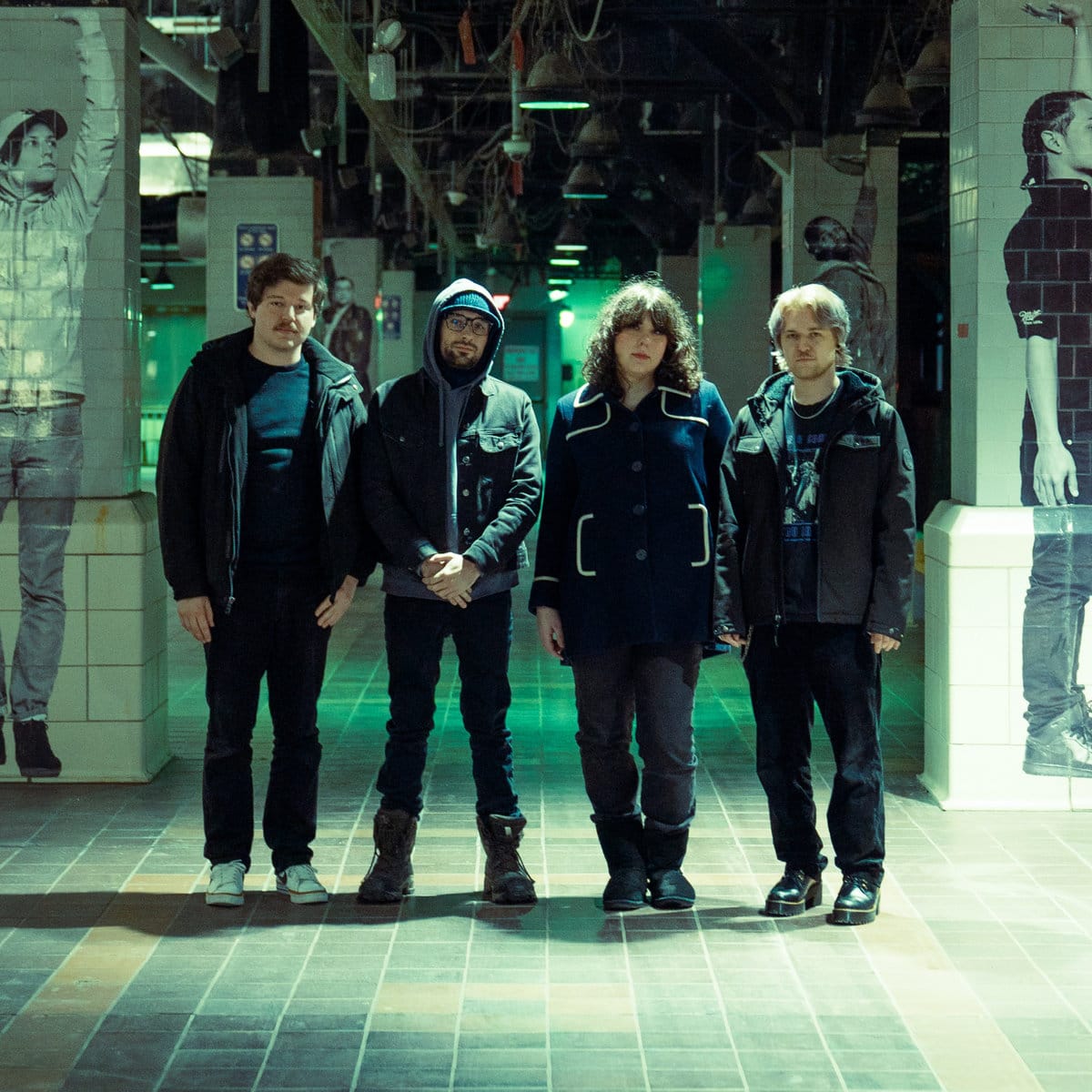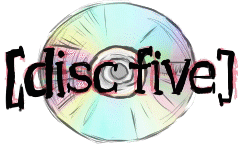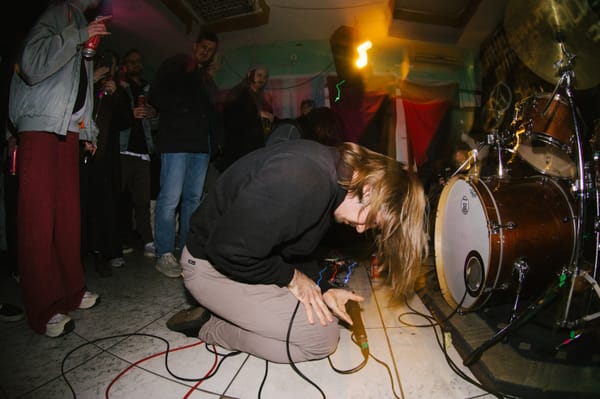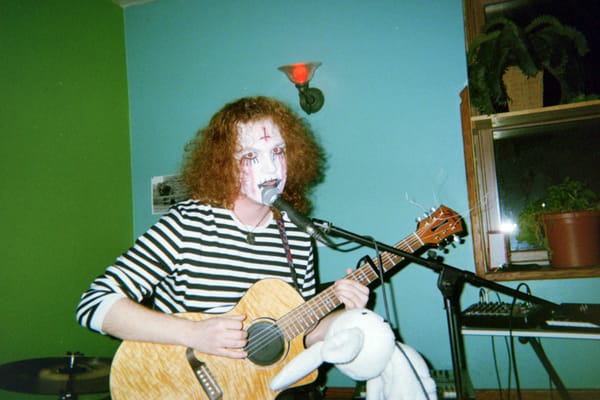The loudest band in Northeast Ohio: Bee Hive Ski Race discuss their debut album, Unlimited Violence Apologia
"I didn't see any reason we should try to limit ourselves to one genre and try to fit into any archetypes."

With the constant bombardment of forced TikTok marketing and algorithmically generated playlists made "Just For You™", it's easy to feel like organic music discovery has been doomed by the capitalist takeover of the Internet. But if you know where to look, you can still find some really special stuff being recommended by real human listeners.
One of your discoveries might be Bee Hive Ski Race’s debut Unlimited Violence Apologia, an album that’s been finding a broader audience thanks to the warm reception it’s garnered on sites like Rate Your Music, Sputnik, and Album of the Year.
From the very first track, it's clear why this album grabbed listeners and made them run to hype it up online. "Entomological Field Research" is a kinetic emo(-ish) track that tears into the suffocating realities of wage slavery, bigotry, and taxpayer funded violence. The song easily navigates its pulses of frantic energy and shifting points of view, letting the listener know that this album will be far more than your average twinkly Midwest emo outing.
And just as you’re readjusting your expectations...hold up, is this morphing into a seven minute long post-rock groove? Wait, are we transitioning into a snarling sludgy monologue that then melds into a bellowing grunge track? Bee Hive Ski Race isn't content to settle into one easily defined genre, instead yanking the listener down several different smog-filled roads.
The band joined me on a video call to talk about the making of the album, their highly collaborative approach, being “four bands in one,” and what it's like being "the loudest band in Northeast Ohio."
How do you feel now that the album's out been out a couple of months?
KATIE BLACKBURN (GUITAR/VOCALS): Personally, I didn't know if anyone was going to listen to this thing, so it's been pretty nice so far. We had no expectations whatsoever because I mean, up until now I had never released a full length.
NATE GLIEBE (DRUMMER): I've done a full length with my other band. But for all of us, I think this was the most hands on that we were for a project, and the longest it took us to record and put together anything. It got close to like, two years of working on it from start to finish. We were hoping that people would care about it, but we didn't know what reach it would have and if people would be able to tell how much time we put into it. But it's been such a good feeling hearing from people.
KATIE: Yeah, and when we saw that [Sputnik] review, we were pretty hyped because he picked up on a lot of things that no one else ever seemed to really pick up on. I don't know how he picked up on the World of Warcraft reference, but it's there.
NICK ROBLES (BASS/VOCALS): That review was awesome to read. It was very validating for us because I mean, we were just kind of working in our own lane. It was incredibly validating that people were picking up what we were putting down.
I first heard about the album because it was climbing up the charts on Rate Your Music. It's been finding its people, for sure.
NICK: Yeah, that was the other thing that took us by a huge surprise - the Rate your Music bump, because that was our first foray into getting our music posted there.
NATE: We had all only been using it as a platform recently, just before the album came out.
NICK: We did not expect that reception at all.
KATIE: Yeah, it was pretty crazy. It almost didn't get uploaded. It was a couple months before the album was going to come out and we were like, “Nate, hey, can you look into how you do this?” Because I certainly had no idea how.
How do you guys approach songwriting? Do you have a primary songwriter?
NATE: In terms of songwriting, we approach it…I would say, probably in an unconventional format. We get together for band practice. We all bring ideas to the table - a riff, a drum part, a certain melody, and we just create. See what works, what doesn't, record it, listen back, see what we like, reconvene next week, and it slowly develops as we go.
TREVOR STOUT (GUITAR): Working on this album was interesting because I had come in when most of the songs were already instrumentally written, aside from some guitar parts that I ended up writing. So I ended up not even being there for a good portion of the instrumental writing, but we still ended up writing a couple songs together for the album. The way we spread out over that time was interesting.
NATE: Due to trips and scheduling, we weren't all in the studio at the exact same time, really, until it came down to vocals. So the lyrics and the actual songwriting for these didn't really come together until the instrumentals were down. It gave us all time to get lyrics together.
NICK: I don't know about all of us…some of us did not have our lyrics together by then.
KATIE: It was a long time writing this, for sure. I think for “Carrier” and “Hurricane”, I took more of a lead because I had more parts in mind that were complete that I brought to practice. But there were other songs, like “Fahrenheit” specifically, that we wrote in, like, one or two goes at one practice.
Wait, so circling back - what is the World of Warcraft reference?
NICK: So the World of Warcraft reference is…well, without getting too lost in the technical sauce, the song [“1.4.0/1.12.1”] is about the past, right? And not being able to reconcile that something is different, and saying that it's actually okay for something to be different. The song title is a split between two [WoW] patches. When they were rolling them out, it was kind of a contentious point in the community - this idea of which one was going to be the actual “original classic.” So the whole song is about getting over the past, illustrating that in a dorky World of Warcraft way.
NICK: The song also ties in some themes about industrialization that’s present throughout the album. We're from Ohio, and in Lorain, we had a really big steel mill. And when my dad was growing up, he would describe how there would be an orange fog that would be over the town that they lived in, and it would stick to the cars. And it was a time that I never lived in, because by the time I came around, there was no steel mill. It’s done. Now other countries to do it for us.
The setting almost feels like its own character in that song. It’s like that on “Gish Gallop,” too - the description of the setting felt very evocative and specific. When you were writing these songs, were there specific places you were referencing? Do you feel that it’s a very Ohio album?
NICK: I wouldn't say it's necessarily an Ohio album to me. Lyrically, that wasn't really my focus. But I mean, I think that when I write, I write from a place that's close to me, right? It’s just a bit of growing up and living around where I am. But it's not exclusive to the Midwest as far as the struggles that I talk about on “Gish Gallop.” I think we all get caught up in commuting home from work sometimes and get really frustrated. I don't know if we all try and sell real estate in Anaheim and get our trailer drone striked…but certainly we feel frustrations when we get laid off.
And those instrumental post-rock-y sections, they were mostly improvised?
KATIE: Yeah, “Fahrenheit” was almost all improv. I feel like I remember being at practice and it just kind of came out of nowhere.
NICK: And “Exhibitionism,” too. Those were all kind of organic.
NATE: Yeah. We had a skeleton of what we wanted - we wanted to start slow, end up chaotic, and see whatever happens in those seven and a half minutes between. So that was one in the studio where it was like, “press record and just do it.“ Same with “Gish Gallop.” That was like, “how do we make something so chaotic, but still feel like it's all roped together?”
That's really interesting to hear, because I would not have thought, “oh, this is something that was just thrown together in the moment,” you know?
KATIE: Well, if we're talking about improv, there were some songs in the studio where vocals and lyrics were improvised by Nick.
NICK: I mean, I don't want to say that everything is necessarily improvised, to be clear. Definitely not everything, but for something like “Gish Gallop,” I will have an idea for a title or theme, like being frustrated about the military industrial complex. And then I'll kind of just go from there and see where my mind takes me. I like taking a loose approach when it comes to doing vocal parts, because I think that there's a part of my brain that works better when I'm not focusing so much on writing something down and making it so deliberate. And sometimes it works and sometimes…well, Nate can attest. Sometimes it's like, 23 takes.
NATE: Like you mentioned, you wouldn't have guessed that a lot of this is improv or loosely done. I think it's because we're all on the same page with everything. We've gone through a lot of practice, we understand the direction we want to take something in, and so we're all so comfortable with our knowledge of the song idea and song direction.
Trevor, I know you were a more recent addition to the band. Did you come into the fold right as the album was starting to get recorded? Or were you playing live shows together prior to the album?
TREVOR: No, actually. I would say I came in in the middle of the instrumental writing process. I wasn't playing shows with them up until our release show in January, just because we were all pretty focused on writing.
When you have played live, have you been able to bust out those longer instrumental pieces like “Fahrenheit”?
TREVOR: Oh, yeah, that's a fun one.
NICK: Yeah, that one actually started live. We played it live first and then I think we decided that we were going to include it like on the album, if I recall correctly.
TREVOR: I remember I was an audience member just taking photos when you played it, and that one blew me away instantly.
Something that really struck me about this album is that it goes in a lot of unexpected places while still remaining cohesive. Were those genre mix-ups added on the fly?
NICK: Well, I think we all come from a really different musical taste. Like, we're four bands mixed into one band, really, and that’s something we wanted to be deliberate about. I think the real awesome thing we've seen people pick up on in reviews is that we're able to make it sound cohesive despite having such a breadth of genres.
TREVOR: Since day one, Nick always said, “let your freak flag fly.” And that stuck with me hard. And like, “don't try to be any one thing.” Do what you feel is best for your part.
NATE: I think one of the things other than the songwriting that we spent the most time on was figuring out the order that these songs were going to go in. We very well could have clumped all the more yell-y songs at the top and like, the weird songs at the bottom or something like that. But through practicing and running them over and over, we made a conscious effort to give it kind of a whiplash feel. There's several songs on the album that kind of get into a groove and get a little more post-rock-y. If we put all those back to back, then sure, the post-rock fans would really dig it, but it might lose the interest of someone who might really love a song on the back half of the album.
KATIE: Before, I was always playing emo bands, and I grew up in the middle of that whole Midwest emo scene. But even though I was listening to that, it just didn't feel like what I wanted to be writing. I didn't see any reason we should try to limit ourselves to one genre and try to fit into any archetypes. That didn't seem very enjoyable at all.
You mentioned pulling from frustrations with the military industrial complex, and obviously with general violence apologia. Do you view this as a very political album?
NICK: Yeah, I would definitely say that this is a political album. 100%.
KATIE: Yeah, I would agree. I think a lot of the topics are very entrenched in politics.
NICK: I think that any artistic expression really is in some way inherently political because it's a part of being a human, you know. You can't really divorce yourself from the forces that you're under.
I’d love to know what everyone's favorite individual contribution to a song is - what little flares you each added to tracks that maybe other people wouldn't immediately pick up on.
NATE: I'm a drummer so a lot of the drum parts I tweaked a lot with. But I just gotta mention the one riff that I contributed - the “Sinkhole” main riff. I also did the recording of the album, the tracking and all that. So I feel like in terms of production, there's a lot of little bits here and there where I was like, “hey, we need to transition from this to this. I'm gonna set up a mic, do some out of pocket to glue this together.”
NATE: At the end of “Gish Gallop,” going into “QueeQueg's Psalm,” you hear that distant murmuring. We were sitting in the studio trying to think of a way to give that a good transition, and I just grabbed random books off the shelf, handed it to everyone, turned it to random pages and said, “alright, go in the tracking room and walk around and read random sentences out of the book.” We've tracked that like, four times to layer it up to make it sound like this chaotic crowd room. So little stuff like that I'm really proud of, we always wanted to be creative in the studio with this.
KATE: One thing that was really fun - we had Nate play the cello on one or two songs and we ran it through my pedal board. And so in the room with the computer, I was just sitting on the floor working on the pedals while Nate played. And I think the cello parts came out really nice. I also just really like the first song on the album. I like how the riffs go together, and we ended up reusing that one riff that's like a little more than halfway through.
TREVOR: I’m proud of us. Writing this was so far outside of anything that I've ever written before. And so it was a really good creative challenge as well, just trusting the process. One of my favorite contributions was on “Hurricane.” A little after the one minute mark, there's this guitar part that me and Katie do together. And it's these very bittersweet sounding chords. I'm always for nostalgic bittersweet sounds. The parts we play together just harmonize very well.
NICK: Yeah, I'm really proud of us. Being in a band is hard and having to stick with a creative endeavor for two years and work on it and have it actually come to fruition is an incredible thing in and of itself. Just being able to finish this was a momentous and awesome thing in and of itself for my ADHD rattled mind.
NATE: Nick, you want me to tell you my favorite contribution of yours?
NICK: Yeah, let me hear it.
NATE: I like your Rainbow Machine that you use.
TREVOR: Yesssss.
NICK: Oh yeah, the Rainbow Machine was fun. We wanted to have motifs, and one of the ones that we really liked was the oscillating of the Rainbow Machine, which is that cool breezy thing that you hear in the breaks.
I'm glad that you brought that up because I wanted to ask what that sound was. It’s a little space-y.
NICK: Yeah, to me, it sounds like an alien saucer scooping somebody up. It ended up giving the album a lot of cohesiveness, too.
KATIE: The nice part about that, too, is we can do it live because it's just a guitar pedal.
NICK: Yeah. We lean into it even more live.
TREVOR: We're so loud live, I've been told.
NICK: I've been told we're the loudest band in Northeast Ohio.
TREVOR: In a good way, in a good way!
KATIE: Oh, in a good way. Absolutely.
NATE: Well, maybe in a bad way, too. I'm fine being loud either way
NICK: And Nate, I like the part where you said, “the song's not over.”
NATE: My one line on the album.
I know you juuuust put out an album, but do you have anything else in the pipeline? Lots of shows?
KATIE: A lot of shows and still writing. We'll do a practice for practicing our set and then we'll try to do the next one for writing. And I think we're probably going to continue having a lot of influences and trying to put them together in interesting ways and keep it fresh.
Keep up with the band here, and support Unlimited Violence Apologia on Bandcamp (they have some sick cassettes for sale in addition to the digital release).
If you're in the area, Bee Hive Ski Race are playing at Under the Surface Records in Tiffin, Ohio on May 16th, and they have another show lined up at Brother's Lounge in Cleveland on June 17th.
Header 📸: @observer.studios




